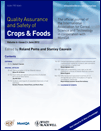
Quality Assurance and Safety of Crops & Foods
Scope & Guideline
Bridging the gap between agriculture and food safety.
Introduction
Aims and Scopes
- Food Safety and Quality Assessment:
The journal emphasizes research on methods and technologies for assessing the safety and quality of food products, including foodborne pathogens, contaminants, and nutritional profiles. - Innovative Agricultural Practices:
It covers advancements in agricultural practices that enhance crop quality and safety, exploring the use of biotechnology, precision agriculture, and integrated pest management. - Risk Assessment and Management:
The journal addresses the evaluation of risks associated with food production, including chemical residues, mycotoxins, and heavy metals, providing insights into effective risk management strategies. - Technological Innovations in Food Processing:
Research on novel food processing techniques, such as nanotechnology, bioprocessing, and machine learning applications in agriculture and food safety, is a key focus area. - Nutritional Enhancement and Functional Foods:
The journal investigates the development of functional foods, including the enhancement of nutritional profiles through innovative processing and formulation strategies.
Trending and Emerging
- Nanotechnology in Food Safety:
Recent publications highlight advancements in nanomaterials for detecting and mitigating mycotoxin contamination, showcasing the journal's focus on innovative solutions for food safety challenges. - Artificial Intelligence and Machine Learning Applications:
There is a growing trend towards utilizing AI and machine learning for predictive analytics in agricultural practices and food safety, indicating a shift towards data-driven approaches. - Sustainable Agricultural Practices:
Emerging themes include integrated agricultural practices that promote sustainability and environmental protection, reflecting increasing global concerns over food security and ecological impacts. - Health Risk Assessment of Contaminants:
Research focusing on the assessment of health risks associated with contaminants in food products, such as heavy metals and pesticides, is on the rise, emphasizing the importance of consumer safety. - Functional Foods and Nutraceuticals:
There is a notable increase in studies related to the development and health benefits of functional foods, including those enriched with probiotics and bioactive compounds.
Declining or Waning
- Traditional Food Safety Methods:
There has been a noticeable decrease in studies focusing on conventional food safety testing methods, as newer, more efficient techniques such as rapid detection and molecular methods gain prominence. - General Agricultural Economics:
While agricultural economics remains relevant, specific studies that do not directly tie economic security to innovative agricultural practices are appearing less frequently. - Basic Crop Cultivation Techniques:
Research centered solely on traditional crop cultivation methods is declining, as the journal increasingly favors studies that integrate technology and innovation into agricultural practices.
Similar Journals
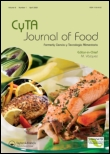
CyTA-Journal of Food
Exploring new horizons in food safety and quality.CyTA-Journal of Food is a prestigious academic journal published by TAYLOR & FRANCIS LTD, dedicated to advancing the field of food science and technology through the dissemination of innovative research and practical knowledge. With an ISSN of 1947-6337 and an E-ISSN of 1947-6345, this journal stands out with its strong impact factor and is currently placed in the Q2 quartile across multiple categories, including Chemical Engineering, Chemistry, and Food Science, making it a vital resource for researchers and professionals alike. The journal has been an integral part of the academic community since its inception in 2009, and continues to publish cutting-edge articles through to 2024. Its alignment with Scopus ranks further signifies its influence, notably achieving 67th percentile in Industrial and Manufacturing Engineering. As an Open Access journal, it ensures widespread accessibility to its valuable content, promoting collaboration and knowledge sharing among scientists, engineers, and students dedicated to enhancing food safety, quality, and sustainability.
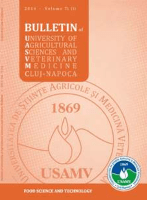
Bulletin of University of Agricultural Sciences and Veterinary Medicine Cluj-Napoca-Food Science and Technology
Advancing Food Science for a Sustainable FutureBulletin of University of Agricultural Sciences and Veterinary Medicine Cluj-Napoca - Food Science and Technology is a prominent peer-reviewed journal dedicated to advancing the field of food science and technology. Published by the University of Agricultural Sciences and Veterinary Medicine Cluj-Napoca, this open-access journal has been serving the academic community since 2013, promoting the dissemination of high-quality research that addresses pressing issues in food safety, quality, and innovation. With its ISSN 2344-2344 and E-ISSN 2344-5300, the journal aims to bridge the gap between academia and industry by providing a platform for scholars and practitioners to share their findings, insights, and methodologies. Situated in the heart of Romania, the journal reflects the country's rich agricultural heritage and its commitment to enhancing global food systems. By maintaining a rigorous editorial standard, the Bulletin ensures that it remains a vital resource for researchers, industry professionals, and students who are keen to explore the latest developments in food science.

ITALIAN JOURNAL OF FOOD SCIENCE
Bridging Tradition and Innovation in Food ScienceITALIAN JOURNAL OF FOOD SCIENCE is a distinguished open-access publication dedicated to advancing knowledge in the field of food science, catering to a global audience of researchers, professionals, and students. Published by Codon Publications in Singapore, this journal, operating under the ISSN 1120-1770 and E-ISSN 2239-5687, has been a vital platform for scholarly discourse since its inception in 1996, converging towards a comprehensive view of food science trends through 2024. With an impressive ranking in the third quartile (Q3) of the Food Science category and a Scopus rank of #151 out of 389, the journal plays a significant role in disseminating high-quality research, contributing to a richer understanding of food science within the agricultural and biological sciences. Since transitioning to open access in 2008, it has further expanded its reach, ensuring that innovative research is accessible to all, thereby fostering collaboration and knowledge exchange in this vital industry.

ACS Food Science & Technology
Fostering Collaboration in Food Chemistry and TechnologyACS Food Science & Technology is a premier peer-reviewed journal published by the American Chemical Society (ACS) that addresses the dynamic intersections of food science, chemistry, and technology. With its E-ISSN: 2692-1944, this journal aims to disseminate innovative research and comprehensive reviews that enhance understanding in fields such as analytical chemistry, organic chemistry, and general food science. Despite the absence of an Open Access model, its position in the Q2 quartile for multiple categories in 2023 underscores its significant impact on the scholarly landscape, ensuring researchers can access high-quality research pertinent to today's food challenges. With an expanding timeline of 2021 to 2024, ACS Food Science & Technology is poised to be an essential resource for advancing the scientific community's knowledge, fostering collaboration, and bridging gaps between academia and industry.

AIMS Agriculture and Food
Transforming agricultural insights into actionable knowledge.AIMS Agriculture and Food is a leading open access journal published by the American Institute of Mathematical Sciences (AIMS), focused on the critical intersections of agricultural and food sciences. Since its inception in 2016, this journal has provided a vital platform for disseminating innovative research and advancements in the fields of agricultural and biological sciences and food science. With impressive Scopus rankings, including a Q2 categorization in 2023 for both Agricultural and Biological Sciences (miscellaneous) and Food Science, AIMS Agriculture and Food is recognized for its significant contributions to the academic community. The journal aims to foster interdisciplinary dialogue by welcoming submissions that tackle contemporary challenges, promote sustainable practices, and enhance food security. Researchers, professionals, and students will find this journal an invaluable resource, offering open access to high-quality, peer-reviewed articles that are essential for informed decision-making in agriculture and food industries.

Food Production Processing and Nutrition
Navigating the future of food processing and nutrition.Food Production Processing and Nutrition, published by SpringerNature, stands at the forefront of advancing knowledge in the vibrant fields of food science, nutrition, and public health. This esteemed Open Access journal, operational since 2019, plays a pivotal role in disseminating breakthrough research that intersects food production processes with nutritional insights, making it an invaluable resource for researchers, professionals, and students alike. With a commendable 2023 impact factor reflecting its robust scholarly contributions — Q1 in Food Science and Q2 in both Nutrition and Dietetics and Public Health, Environmental and Occupational Health — the journal not only emphasizes the importance of innovative food processing methods but also addresses pressing nutritional challenges faced globally. Located in the United Kingdom, it claims an impressive Scopus ranking, with a notable percentile standing across various categorical metrics. As such, Food Production Processing and Nutrition is essential for anyone aiming to deepen their understanding of how food systems impact public health through effective processing and nutritional strategies.
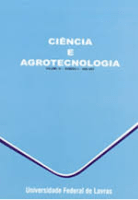
CIENCIA E AGROTECNOLOGIA
Fostering Knowledge Exchange in Agronomy and BeyondCIENCIA E AGROTECNOLOGIA, published by UNIV FEDERAL LAVRAS-UFLA, is a vital open-access journal since 2005 that serves as an influential platform for disseminating research in the fields of Agronomy, Animal Science, Food Science, Soil Science, and Veterinary Science. With its ISSN 1413-7054 and E-ISSN 1981-1829, this journal is recognized for its contribution to science and technology advancements in agriculture, particularly in Brazil, fostering knowledge exchange among researchers, professionals, and students. Currently ranked in the Q2 quartile for Agronomy and Crop Science, Animal Science and Zoology, and in the Q3 quartile for Food Science and Soil Science, it demonstrates a solid international standing in the relevant Scopus indices. The journal's commitment to open access ensures that critical research findings are freely available, enabling a broader impact and encouraging collaborative advancements in agritech. As the journal looks towards its converged years from 2007 to 2024, it continues to uphold its objectives of promoting sustainable practices and innovation within the agricultural sciences.
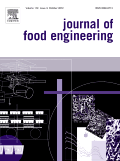
JOURNAL OF FOOD ENGINEERING
Exploring the intersection of science and culinary engineering.JOURNAL OF FOOD ENGINEERING, published by ELSEVIER SCI LTD, stands as a leading platform for innovative research within the realm of food science, focusing on the engineering principles applied to food production and processing. With an impressive impact factor reflective of its significance in the field, the journal boasts a Q1 ranking in Food Science and ranks #23 out of 389 in Agricultural and Biological Sciences according to Scopus metrics, placing it in the 94th percentile among its peers. Since its inception in 1982, the journal has aimed to disseminate high-quality, peer-reviewed research that informs and shapes industry practices and academic explorations. Although it does not currently offer an open access option, the journal is dedicated to fostering knowledge and innovation through rigorous editorial standards and a commitment to covering a broad range of topics related to food engineering. Researchers, professionals, and students alike will find the journal an invaluable resource for advancing their understanding of the scientific and technological facets of food systems.
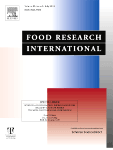
FOOD RESEARCH INTERNATIONAL
Empowering the Global Food Science CommunityFOOD RESEARCH INTERNATIONAL is a premier academic journal published by ELSEVIER, specializing in the field of Food Science. With an impressive impact factor and ranked Q1 in the 2023 category quartiles, it stands at the forefront of research, positioned 17th out of 389 in the Scopus ranking for Agricultural and Biological Sciences, attaining a commendable 95th percentile. The journal publishes high-quality, peer-reviewed articles that cover a broad spectrum of topics, including food safety, quality control, nutrition, and biotechnology, making it an invaluable resource for academics, industry professionals, and students alike. As FOOD RESEARCH INTERNATIONAL seeks to enhance understanding and advance technologies related to food, it encourages innovative perspectives and interdisciplinary research. The journal, active from 1992 and continuing through 2024, is an essential platform for disseminating vital findings and fostering collaboration within the global food science community.
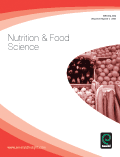
Nutrition & Food Science
Elevating food science and nutrition through rigorous scholarship.Nutrition & Food Science, published by EMERALD GROUP PUBLISHING LTD, is a prominent journal dedicated to advancing the understanding of nutritional science and food technology. With an ISSN of 0034-6659 and an E-ISSN of 1758-6917, this journal has provided a platform for scholarly articles, reviews, and insightful research since its inception in 1971. The journal is recognized in the Q3 quartile for both Food Science and Nutrition and Dietetics categories, showcasing its moderate impact within the field. Currently ranked #202 in Food Science and #81 in Nutrition and Dietetics based on Scopus metrics, it caters to a diverse audience of researchers, practitioners, and students eager to explore the latest findings and developments. While not an open-access journal, it offers various subscription options for individuals and institutions keen on accessing high-quality research. With a commitment to interdisciplinary collaboration and practical applications, Nutrition & Food Science is an essential resource for those invested in improving health outcomes through informed dietary practices and food innovations.